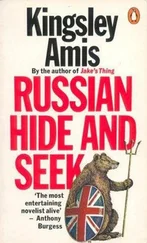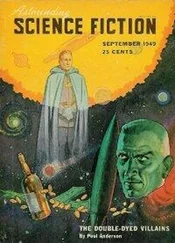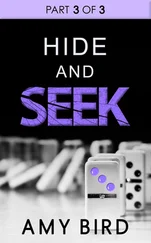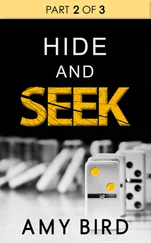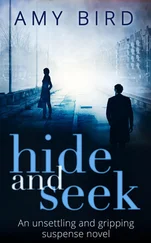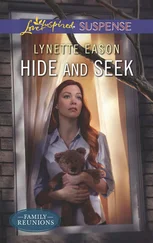Уилки Коллинз - Hide and Seek
Здесь есть возможность читать онлайн «Уилки Коллинз - Hide and Seek» весь текст электронной книги совершенно бесплатно (целиком полную версию без сокращений). В некоторых случаях можно слушать аудио, скачать через торрент в формате fb2 и присутствует краткое содержание. Год выпуска: 2005, Жанр: Классическая проза, на английском языке. Описание произведения, (предисловие) а так же отзывы посетителей доступны на портале библиотеки ЛибКат.
- Название:Hide and Seek
- Автор:
- Жанр:
- Год:2005
- ISBN:нет данных
- Рейтинг книги:5 / 5. Голосов: 1
-
Избранное:Добавить в избранное
- Отзывы:
-
Ваша оценка:
- 100
- 1
- 2
- 3
- 4
- 5
Hide and Seek: краткое содержание, описание и аннотация
Предлагаем к чтению аннотацию, описание, краткое содержание или предисловие (зависит от того, что написал сам автор книги «Hide and Seek»). Если вы не нашли необходимую информацию о книге — напишите в комментариях, мы постараемся отыскать её.
Hide and Seek — читать онлайн бесплатно полную книгу (весь текст) целиком
Ниже представлен текст книги, разбитый по страницам. Система сохранения места последней прочитанной страницы, позволяет с удобством читать онлайн бесплатно книгу «Hide and Seek», без необходимости каждый раз заново искать на чём Вы остановились. Поставьте закладку, и сможете в любой момент перейти на страницу, на которой закончили чтение.
Интервал:
Закладка:
“When people in the town, who knew of our calamity, and had seen the advertisement, talked to me of it, I admitted nothing, and denied nothing—I simply refused to speak with them on the subject of what had happened in our family.
“Having endeavored to provide in this way for the protection of my brother and myself against the meddling and impertinence of idle people, I believed that I had now suffered the last of the many bitter trials which had assailed me as the consequences of my niece’s guilt: I was mistaken: the cup of my affliction was not yet full. One day, hardly a fortnight after I had sent the burial money anonymously to Bangbury, our servant came to me and said there was a stranger at the door who wished to see my brother, and was so bent on it that he would take no denial. I went down, and found waiting on the door-steps a very respectable-looking, middle-aged man, whom I had certainly never set eyes on before in my life.
“I told him that I was Joshua’s sister, and that I managed my brother’s affairs for him in the present state of his health. The stranger only answered, that he was very anxious to see Joshua himself. I did not choose to expose the helpless condition into which my brother’s intellects had fallen, to a person of whom I knew nothing; so I merely said, the interview he wanted was out of the question, but that if he had any business with Mr. Grice, he might, for the reasons I had already given, mention it to me. He hesitated, and smiled, and said he was very much obliged to me; and then, making as if he was going to step in, added that I should probably be able to appreciate the friendly nature of the business on which he came, when he informed me that he was confidentially employed by Mr. Arthur Carr.
“The instant he spoke it, I felt the name go to my heart like a knife—then my indignation got the better of me. I told him to tell Mr. Carr that the miserable creature whom his villainy had destroyed, had fled away from her home, had died away from her home, and was buried away from her home; and, with that, I shut the door in his face. My agitation, and a sort of terror that I could not account for, so overpowered me that I was obliged to lean against the wall of the passage, and was unable, for some minutes, to stir a step towards going up stairs. As soon as I got a little better, and began to think about what had taken place, a doubt came across me as to whether I might not have acted wrong. I remembered that Joshua’s lawyers in London had made it a great point that this Mr. Carr should be traced; and, though, since then, our situation had been altered by my niece’s death, still I felt uncertain and uneasy—I could hardly tell why—at what I had done. It was as if I had taken some responsibility on myself which ought not to have been mine. In short, I ran back to the door and opened it, and looked up and down the street. It was too late: the strange man was out of sight, and I never set eyes on him again.
“This was in March, 1828, the same month in which the advertisement appeared. I am particular in repeating the date because it marks the time of the last information I have to give, in connection with the disgraceful circumstances which I have here forced myself to relate. Of the child mentioned in the advertisement, I never heard anything, from that time to this. I do not even know when it was born. I only know that its guilty mother left her home in the December of 1827. Whether it lived after the date of the advertisement, or whether it died, I never discovered, and never wished to discover. I have kept myself retired since the days of my humiliation, hiding my sorrow in my own heart, and neither asking questions nor answering them.”
At this place Mat once more suspended the perusal of the letter. He had now read on for an unusually long time with unflagging attention, and with the same stern sadness always in his face, except when the name of Arthur Carr occurred in the course of the narrative. Almost on every occasion, when the finger by which he guided himself along the close lines of the letter, came to those words, it trembled a little, and the dangerous look grew ever brighter and brighter in his eyes. It was in them now, as he dropped the letter on his knee, and, turning round, took from the wall behind him, against which it leaned, a certain leather bag, already alluded to, as part of the personal property that he brought with him on installing himself in Kirk Street. He opened it, took out a feather fan, and an Indian tobacco-pouch of scarlet cloth; and then began to search in the bottom of the bag, from which, at length, he drew forth a letter. It was torn in several places, the ink of the writing in it was faded, and the paper was disfigured by stains of grease, tobacco, and dirt generally. The direction was in such a condition, that the word “Brazils,” at the end, was alone legible. Inside, it was not in a much better state. The date at the top, however, still remained tolerably easy to distinguish: it was “December 20th, 1827.”
Mat looked first at this, and then at the paragraph he had just been reading, in Joanna Grice’s narrative. After that, he began to count on his fingers, clumsily enough—beginning with the year 1828 as Number One, and ending with the current year, 1851, as Number Twenty-three. “Twenty-three,” he repeated aloud to himself, “twenty-three years: I shall remember that.”
He looked down a little vacantly, the next moment, at the old torn letter again. Some of the lines, here and there, had escaped stains and dirt sufficiently to be still easily legible; and it was over these that his eyes now wandered. The first words that caught his attention ran thus:—“I am now, therefore, in this bitter affliction, more than ever desirous that all past differences between us should be forgotten, and”—here the beginning of another line was hidden by a stain, beyond which, on the cleaner part of the letter, the writing proceeded:—“In this spirit, then, I counsel you, if you can get continued employment anywhere abroad, to accept it, instead of coming back”—(a rent in the paper made the next words too fragmentary to be easily legible). * * * “any good news be sure of hearing from me again. In the mean time, I say it once more, keep away, if you can. Your presence could do no good; and it is better for you, at your age, to be spared the sight of such sorrow as that we are now suffering.” (After this, dirt and the fading of the ink made several sentences near the end of the page almost totally illegible—the last three or four lines at the bottom of the letter alone remaining clear enough to be read with any ease.) * * * “the poor, lost, unhappy creature! But I shall find her, I know I shall find her; and then, let Joanna say or do what she may, I will forgive my own Mary, for I know she will deserve her pardon. As for him, I feel confident that he may be traced yet; and that I can shame him into making the atonement of marrying her. If he should refuse, then the black-hearted villain shall—”
At this point, Mat abruptly stopped in his reading; and, hastily folding up the letter, put it back in the bag again, along the feather fan and the Indian pouch. “I can’t go on that part of the story now, but the time may come—” He pursued the thought which thus expressed itself in him no further, but sat still for a few minutes, with his head on his hand and his heavy eyebrows contracted by an angry frown, staring sullenly at the flame of the candle. Joanna Grice’s letter still remained to be finished. He took it up, and looked back to the paragraph that he had last read.
“As for the child mentioned in the advertisement”—those were the words to which he was now referring. “The child?” —There was no mention of its sex. “I should like to know if it was a boy or a girl,” thought Mat.
Читать дальшеИнтервал:
Закладка:
Похожие книги на «Hide and Seek»
Представляем Вашему вниманию похожие книги на «Hide and Seek» списком для выбора. Мы отобрали схожую по названию и смыслу литературу в надежде предоставить читателям больше вариантов отыскать новые, интересные, ещё непрочитанные произведения.
Обсуждение, отзывы о книге «Hide and Seek» и просто собственные мнения читателей. Оставьте ваши комментарии, напишите, что Вы думаете о произведении, его смысле или главных героях. Укажите что конкретно понравилось, а что нет, и почему Вы так считаете.


